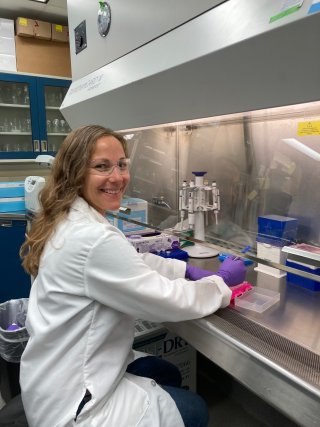Meet EPA Researcher Kiara Lech, Ph.D.

Dr. Kiara Lech is a biologist and works on oil spill research, including studies to understand oil biodegradation and the effects of oil in freshwater ecosystems. Her team just completed the experimental portion of a crude oil exposure study at EPA’s Experimental Streams Facility (ESF) assessing ecological impacts of oil in freshwater ecosystems. She is in the process of developing a study assessing the effectiveness of bioremediation agents on oil biodegradation, in collaboration with EPA Region 5. Kiara is also finalizing the results of an earlier study looking at how photochemical weathering of crude oil affects oil biodegradation.
Tell us about your background.
My career, almost exclusively, has been focused on water quality. My background is in contaminant biodegradation, environmental microbiology, and analytical chemistry. Prior to EPA, I worked at the US Geological Survey for many years and in research and development at a bioenergy start-up company.
When did you first know you wanted to work in environmental science?
As a freshman, I took a week-long high school ecology/limnology field trip led by my science teachers up to Madeline Island on Lake Superior. I owe my career to Mr. Zaiman and Dr. Bob!
What do you like most about your job?
Being able to conduct science that ultimately serves the people.
How does your science matter?

My work in ORD closes knowledge gaps regarding the fate and effects of petroleum oil in the environment, helping inform responders tasked with operational decision-making during an oil spill event.
If you weren’t a scientist, what would you be doing?
Something related to food advocacy, healthy eating, and regenerative farming.
What advice would you give a student interested in a career in science?
Allow yourself to work outside your supposed “area of expertise”—it’ll make you a better scientist and give you the ability to communicate across disciplines.
If you can have any superpower, what would you choose?
To be able to heal the sick.
What do you think the coolest scientific discovery was and why?
PCR (polymerase chain reaction)—it revolutionized life science, as we knew it.
Editor's Note: The opinions expressed herein are those of the researcher alone. EPA does not endorse the opinions or positions expressed.
